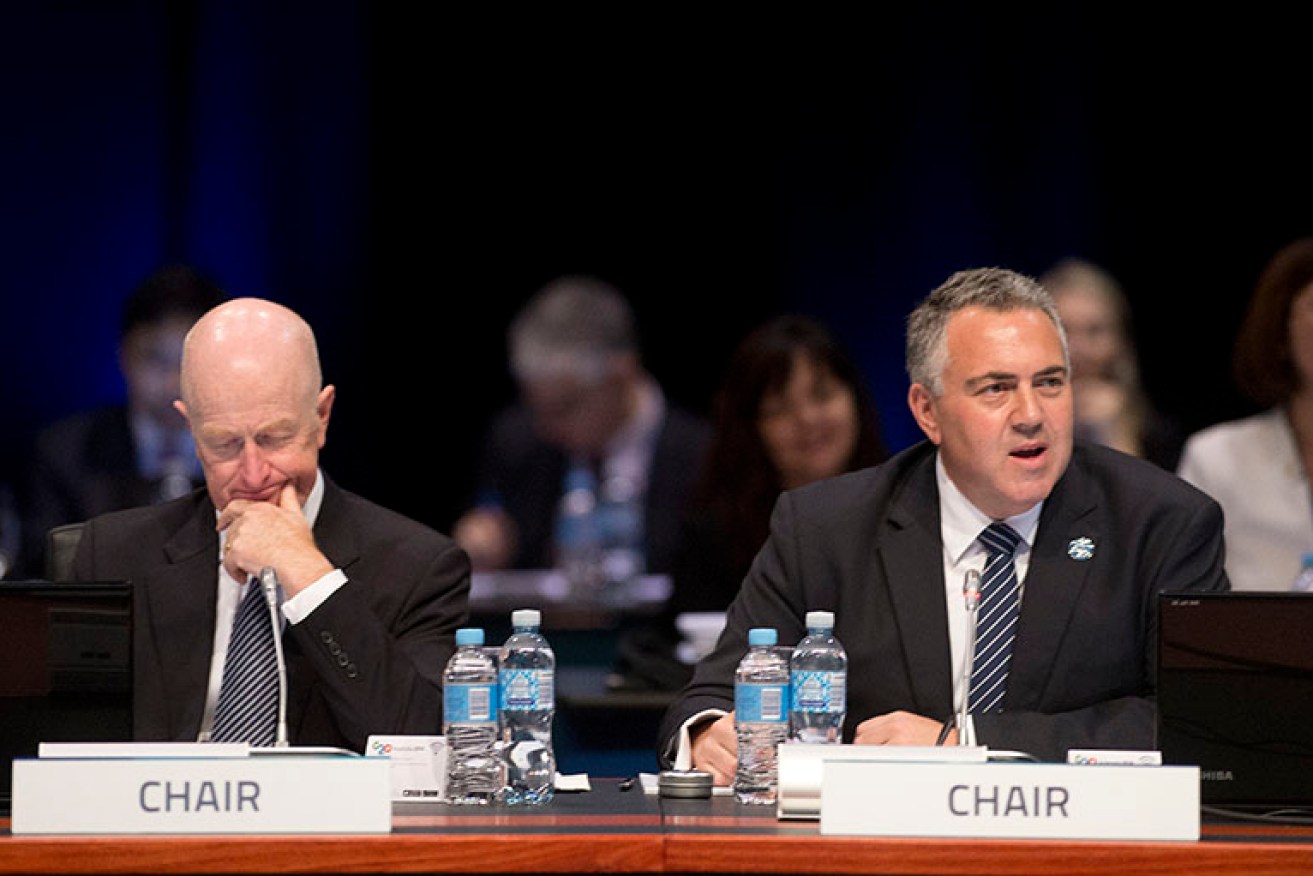Hockey vs Stevens: who has the real power?

Two men have been charged with guiding the nation through often troubled economic waters. What these two men do has a huge effect on the lives of 23 million Australians.
But which one – Treasurer Joe Hockey, or Reserve Bank governor Glenn Stevens – is more powerful?
• Why the rate cut exposes Abbott’s bigger mistakes
• Borrowers’ bonanza: rates cut to record low
As the man in charge of deciding how to collect and spend tax, Joe Hockey is the obvious answer. He oversees a multitude of decisions in every area of the economy.
Glenn Stevens, meanwhile, essentially has one decision to make, among a choice of three: lift interest rates, cut interest rates, or keep interest rates on hold.
Put that way, it would appear obvious that the Treasurer is the more powerful. But Mr Hockey’s epic failure to pass so many measures in his first Budget throws this assumption into doubt.
Intergenerational theft

Joe Hockey believes national debt is a form of theft from our grandchildren. Photo: AAP
One of the big themes of the Abbott government’s approach to setting fiscal policy is captured in the idea of “intergenerational theft”.
It has repeatedly used this concept to justify big spending cuts.
Here’s how the Treasurer justified the cuts to welfare and services in his maiden Budget speech in May: “[U]nless we fix the Budget together, we will leave the next generation a legacy of debt, not opportunity. As Australians, we must not leave our children worse off.”
Prime Minister Tony Abbott reiterated the theme at his Press Club speech on Monday.
“We’ve never been a country that’s ripped off future generations to pay for today,” Mr Abbott said.
“And under my government, we never will.”
But who is doing most of the heavy lifting towards achieving this objective? Is it the Treasurer or the Reserve Bank governor?
Stevens does Hockey’s job for him
Right now, Mr Stevens seems to be doing more to realise the government’s stated goal than the government.
The 0.25 per cent official cut has already lowered the home loan rates of most home borrowers to reduce monthly interest repayments by up to $60 on a $300,000 mortgage.
That’s a great benefit for cash-strapped people under 40 who have low savings balances and a fat mortgage.
It’s a quite different story for wealthier baby boomers who already own their house and have a lifetime of personal savings in the bank.

Is Glenn Stevens an accidental Robin Hood? Photo: AAP
These people, most of whom are aged 50 and over, will have their deposit rates slashed by the banks.
Whether that is an equitable outcome probably depends on your age, but it underlines an important point that rate cuts are currently the main policy method through which wealth is being redistributed to battlers in Australia.
Such effects, of course, are accidental because the RBA does not set out to use monetary policy as an instrument for wealth redistribution.
Hockey’s Budget spooked consumers
One of the great errors of the 2014 Federal Budget was the government’s almost complete disregard for the critical role that consumer demand plays in Australia’s economy.
When budgets scare the public – like Mr Hockey’s first one did – consumers become cautious and defer spending. This was one of the key factors that drove the RBA to cut.
To rebuild consumer confidence, economists are now advising the government to take a more expansive approach to reducing the deficit that is less focused on penalising the poor and disadvantaged.
Super tax concessions are ‘intergenerational theft’
New Treasury estimates released last week suggest that the impact of tax breaks on superannuation is set to blow out by more than $30 billion in the next three years.
Today, young people on low and average incomes are subsidising the retirements of multi-millionaires through the lucrative tax concessions.
Leading economist Dr Richard Denniss of The Australia Institute says there is no other policy area where the problem of “intergenerational theft” is so pronounced.
And even though the super tax concessions are set to bleed the budget dry, the government is doing nothing about it.

Are the two heavyweights even fighting in the same ring? Photo: AAP
“The Abbott government says it will do anything to repair the budget bottom line, but their definition of anything does not extend to closing the loopholes which are draining tens of billions of dollars from the budget each year,” he said.
“The vast majority of the benefits of these concessions go to the wealthiest 20 per cent of households.”
Dr Denniss says the major cause of the deficit is the rapid decline in the amount of tax that is being collected from high-income earners.
RBA and Treasury at odds
Dr Denniss is also worried that the RBA and the government have been operating at cross purposes since the May Budget was announced.
“While monetary policy is trying to stimulate the economy at the moment, our Treasurer is using fiscal policy to contract it,” Dr Denniss said.
“It is a clear case of monetary policy and fiscal policy being at odds with each other in terms of their objectives and their impact.”








